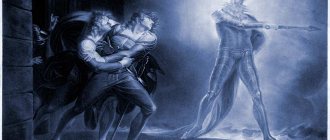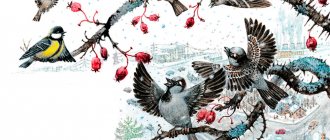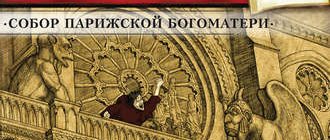- Summary
- Shakespeare William
- Richard 3
The work is written about Richard, who, despite all the ridicule and difficulties, tries to become the only king, eliminating all rivals in his path, including his brothers. He wants to marry Anna, the widow of the late heir, and she agrees. Richard is elated because he is very good at gaining people's trust and influencing them.
Richard, with the help of mercenaries, kills a prisoner who is the king's brother, lying that the queen ordered it, but before his death the prisoner manages to find out who ordered his death.
The current King named Edward was very ill and in anticipation of his death, he convenes the warring parties and asks them to make peace among themselves, they agree. Queen Elizabeth asks Richard to release the prisoner he imprisoned, but he refuses, saying that this is not possible, he was killed. Everyone was at a loss. The king tries to find out who killed his brother, but to no avail.
Unable to withstand grief, the King soon dies. Now the throne rightfully belongs to his young heir. A convoy is poisoned behind him, but Richard goes to great lengths to gain power, and along the way he intercepts the escort and takes him into custody. The Queen is immediately informed about this. Richard convinces the heir that his relatives are bad and offers to wait temporarily in Tawel. Fearing that he will lose his right to the crown, he decides to execute all the Queen's relatives.
Since there is no heir, Richard is offered to accept the crown, and in order to remove suspicions that he needs power, he publicly exposes himself as a believer and a noble man. He eventually becomes King Richard III. In order to stay on the throne, he needs new victims. She breaks off her marriage to Anna and locks her away, telling everyone that she is sick. Soon he gives the order to kill the little prince, and the mercenaries strangle him in his own room.
With his reign, the situation in the country worsens, and a fleet under the command of Richmond, who has the right to the throne, advances against Richard from France.
In the war with Richmond, he dies, and Richmond becomes the true king of England. The Tyurd dynasty begins with him.
You can use this text for a reader's diary
Currently reading
- Summary of Nosov Mishkina porridge
Kolya lives with his mother in the country. One day, his best friend Mishka comes to visit the boy. Kolya is very happy. Mom notices that this is very useful, since she is going to the city for a couple of days, and the guys can stay at the dacha alone - Summary Sholokhov Food Commissar
The surplus appropriation system covered village after village, district after district. The army and the center needed grain, and no one stood on ceremony with those who covered the precious bread grown by hard work. Malicious “kulaks” were shot - Shmelev Ivan
- Summary Escape from Freedom Fromm
Erich Fromm's book “Escape from Freedom” is devoted to several aspects of psychology. The book was published in 1941. That is why the human personality he describes is different from the modern personality. - Summary The history of one city briefly and chapter by chapter Saltykov-Shchedrin
The story tells about the “true” history of the small town of Flood. It is a chronicle compiled by four local archivists. The author insists that the story actually happened and there is no need to doubt the veracity of the story.
Summary of Richard III - chapter summaries of works
Richard III William Shakespeare Richard III
When Richard was born, there was a hurricane that destroyed trees. Foreshadowing timelessness, an owl screamed and an eagle owl cried, dogs howled, a raven croaked ominously and magpies chirped. During the most difficult labor, a shapeless lump was born, from which her own mother recoiled in horror. The baby was hunchbacked, lopsided, with legs of different lengths. But with teeth - to gnaw and torment people, as they would angrily tell him later. He grew up labeled a freak, suffering humiliation and ridicule. The words “ungodly” and “ugly” were thrown into his face, and dogs began to bark at the sight of him. The son of Plantagenet, under his older brothers he was virtually deprived of hopes for the throne and was doomed to be content with the role of a noble jester. However, he turned out to be endowed with a powerful will, ambition, political talent and serpentine cunning. He happened to live in an era of bloody wars, internecine strife, when there was a merciless struggle for the throne between York and Lancaster, and in this element of treachery, betrayal and sophisticated cruelty, he quickly mastered all the subtleties of court intrigue. With the active participation of Richard, his elder brother Edward became King Edward IV, having defeated the Lancasters. To achieve this goal, Richard, Duke of Gloucester, killed the nobleman Warwick along with his brothers, the Lancaster associate, killed the heir to the throne, Prince Edward, and then personally stabbed the captive King Henry in the Tower VI, coolly remarking over his corpse: “First for you, then it’s the other’s turn. / May I be low, but my path leads upward.” King Edward, who exclaimed at the end of the previous chronicle: “Roll, trumpet! Goodbye to all troubles! / Happy years await us!” - and did not suspect what devilish plans were brewing in the soul of his brother.
The action begins three months after Edward's coronation. Richard speaks contemptuously of how the harsh days of struggle have given way to idleness, debauchery and boredom. He calls his “peaceful” age puny, pompous and talkative, and declares that he curses lazy amusements. He decides to turn all the power of his nature into steady progress towards personal power. “I decided to become a scoundrel...” The first steps towards this have already been taken. With the help of slander, Richard ensures that the king stops trusting his brother George, Duke of Clarence, and sends him to prison - as if for his own safety. Having met Clarence, who is being taken to the Tower under guard, Richard hypocritically sympathizes with him, while he himself rejoices in his heart. From Lord Chamberlain Hastings he learns another good news for him: the king is ill and the doctors are seriously afraid for his life. Edward’s craving for harmful entertainment, which drained his “royal body,” took its toll. So, the elimination of both brothers becomes a reality.
Richard, meanwhile, embarks on an almost impossible task: he dreams of marrying Anne Warwick, Warwick's daughter and widow of Prince Edward, whom he himself killed. He meets Anne as she, in deep mourning, accompanies the coffin of King Henry VI, and immediately begins a direct conversation with her. This conversation is striking as an example of the rapid conquest of a woman’s heart with the only weapon - the word. At the beginning of the conversation, Anna hates and curses Gloucester, calls him a sorcerer, a scoundrel and an executioner, and spits in his face in response to his insinuating speeches. Richard endures all her insults, calls Anna an angel and a saint and puts forward a single argument in his justification: he committed all the murders only out of love for her. Either with flattery or witty subterfuges, he fends off all her reproaches. She says that even animals feel pity. Richard agrees that he knows no pity - therefore, he is not an animal. She accuses him of killing her husband, who was “kind, pure and merciful,” Richard remarks that in this case it would be more fitting for him to be in heaven. As a result, he irrefutably proves to Anna that the reason for her husband’s death is her own beauty. Finally, he bares his chest and demands that Anna kill him if she does not want to forgive. Anna drops the sword, gradually softens, listens to Richard without the previous shudder and finally accepts the ring from him, thereby giving hope for their marriage...
When Anna leaves, the excited Richard cannot recover from the ease of victory over her: “What! I, who killed my husband and father, / I took possession of her in an hour of bitter anger... / God, and the court, and conscience were against me, / And there were no friends to help me. / Just the devil and a feigned appearance... / And yet she’s mine... Ha-ha!” And he is once again convinced of his limitless ability to influence people and subjugate them to his will.
Next, Richard, without flinching, carries out his plan to kill Clarence, imprisoned in the Tower: he secretly hires two thugs and sends them to prison. At the same time, he convinces the simpleton nobles Buckingham, Stanley, Hastings and others that the arrest of Clarence is the machinations of Queen Elizabeth and her relatives, with whom he himself is at enmity. Only before his death does Clarence learn from the killer that Gloucester is the culprit of his death.
The sick King Edward, in anticipation of his imminent death, gathers his courtiers and asks representatives of the two warring camps - the king’s entourage and the queen’s entourage - to make peace and swear further tolerance towards each other. Peers exchange promises and handshakes. The only thing missing is Gloucester. But then he himself appears. Upon learning of the truce, Richard passionately assures that he hates enmity, that in England he has no more enemies than a newborn baby, that he asks for forgiveness from all noble lords if he has accidentally offended anyone, and the like. Joyful Elizabeth appeals to the king with a request in honor of the solemn day to immediately release Clarence. Richard dryly objects to her: it is impossible to return Clarence, because “everyone knows that the noble Duke is dead!” A moment of general shock ensues. The king asks who gave the order to kill his brother, but no one can answer him. Edward bitterly laments what happened and has difficulty getting to the bedroom. Richard quietly draws Buckingham's attention to how the queen's relatives have turned pale, hinting that they are the ones to blame for what happened.
Unable to bear the blow, the king soon dies. Queen Elizabeth, the king's mother the Duchess of York, Clarence's children - they all bitterly mourn the two dead. Richard joins them with mournful words of sympathy. Now, by law, the throne must be inherited by eleven-year-old Edward, the son of Elizabeth and the late king. The nobles send a retinue for him to Ledlo.
In this situation, the queen's own - the heir's uncle and half-brothers - pose a threat to Richard. And he gives the order to intercept them on the way to the prince and take them into custody at Pamfret Castle. The messenger conveys this news to the queen, who begins to rush about in mortal fear for the children. The Duchess of York curses the days of unrest, when the victors, having defeated their enemies, immediately enter into battle with each other, “brother for brother and blood for blood…”.
The courtiers meet the little Prince of Wales. He behaves with the touching dignity of a true monarch. He is saddened that he does not yet see Elizabeth, his maternal uncle and his eight-year-old brother York. Richard explains to the boy that his mother’s relatives are deceitful and harbor poison in their hearts. The prince completely trusts Gloucester, his guardian, and accepts his words with a sigh. He asks his uncle where he will live before the coronation. Richard replies that he “would advise” to live temporarily in the Tower until the prince chooses another pleasant home. The boy shudders, but then obediently agrees with his uncle's will. Little York arrives - mocking and insightful, who annoys Richard with sarcastic jokes. Finally both boys are escorted to the Tower.
Richard, Buckingham and their third ally Catesby had already secretly agreed to place Gloucester on the throne. We also need to enlist the support of Lord Hastings. Catesby is sent to him. Waking up Hastings in the middle of the night, he reports that their common enemies - the queen's relatives - will now be executed. This delights the lord. However, the idea of coronating Richard, bypassing little Edward, causes Hastings to be indignant: “... so that I vote for Richard, / dispossess the direct heir, / - no, I swear to God, I’ll soon die!” The short-sighted nobleman is confident in his own safety, but meanwhile Richard has prepared death for anyone who dares to interfere with him on his way to the crown.
The execution of the queen's relatives takes place in Pamfret. And at this time the Council of State meets in the Tower, which is obliged to set the day of the coronation. Richard himself appears late at the council. He already knows that Hastings refused to participate in the conspiracy, and quickly orders that he be taken into custody and his head cut off. He even declares that he will not sit down to dinner until they bring him the head of the traitor. In a late epiphany, Hastings curses “bloody Richard” and meekly goes to the scaffold.
After his departure, Richard begins to cry, lamenting over human infidelity, informs the council members that Hastings was the most secretive and crafty traitor, that he was forced to decide on such a drastic measure in the interests of England. The deceitful Buckingham readily echoes these words.
Now it is necessary to finally prepare public opinion, which is what Buckingham is doing again. At the direction of Gloucester, he spreads rumors that the princes are the illegitimate children of Edward, that his marriage with Elizabeth itself is also illegal, and lays out various other grounds for Richard’s accession to the English throne. The crowd of townspeople remains deaf to these speeches, but the mayor of London and other nobles agree that Richard should be asked to become king.
The highest moment of celebration arrives: a delegation of noble citizens comes to the tyrant to beg him for the grace to accept the crown. This episode was directed with diabolical skill by Richard. He arranges the matter in such a way that the petitioners find him not just anywhere, but in the monastery, where he, surrounded by the holy fathers, is deep in prayer. Having learned about the delegation, he does not immediately go out to her, but, appearing in the company of two bishops, plays the role of a simple-minded man, far from earthly vanity, who fears the “yoke of power” more than anything else in the world and dreams only of peace. His sanctimonious speeches are delightful in their subtle hypocrisy. He persists for a long time, forcing those who come to talk about how kind, tender-hearted and necessary he is for the happiness of England. When, finally, the townspeople, desperate to break his reluctance to become king, leave, he seems to reluctantly ask them to return. “Let your violence be my shield / from dirty slander and dishonor,” he prudently warns.
The obsequious Buckingham hurries to congratulate the new king of England, Richard III.
And after achieving the cherished goal, the bloody chain cannot be broken. On the contrary, according to the terrible logic of things, Richard requires new sacrifices to strengthen his position - for he himself realizes how fragile and illegal it is: “My throne is on fragile crystal.” He frees himself from Anna Warwick, who was in an unhappy and painful marriage with him for a short time. It is not for nothing that Richard himself once remarked that he did not know the feeling of love inherent in all mortals. Now he gives orders to lock up his wife and spread rumors about her illness. He himself intends, having harassed Anna, to marry the daughter of the late King Edward, his brother. However, first he must commit one more crime - the most monstrous one.
Richard tests Buckingham, reminding him that little Edward is still alive in the Tower. But even this noble lackey grows cold at the terrible hint. Then the king looks for the greedy courtier Tyrrell, whom he instructs to kill both princes. He hires two bloodthirsty bastards who use Richard’s pass to enter the Tower and strangle sleepy children, and later they themselves cry from what they have done.
Richard accepts the news of the princes' deaths with grim satisfaction. But she does not bring him the peace he desires. Under the rule of a bloody tyrant, unrest begins in the country. On the French side, powerful Richmond, Richard’s rival in the struggle for the right to own the throne, comes with a fleet. Richard is enraged, full of rage and ready to fight all enemies. Meanwhile, his most reliable supporters have already either been executed - like Hastings, or fallen into disgrace - like Buckingham, or secretly betrayed him - like Stanley, horrified by his terrible essence...
The last, fifth act begins with another execution - this time of Buckingham. The unfortunate man admits that he believed Richard more than anyone else and for this he is now severely punished.
Further scenes unfold directly on the battlefield. The opposing regiments of Richmond and Richard are stationed here. The leaders spend the night in their tents. They fall asleep at the same time - and in their dreams the spirits of people executed by the tyrant appear to them one by one. Edward, Clarence, Henry VI, Anne Warwick, little princes, native queens, Hastings and Buckingham - each of them, before the decisive battle, turns his curse on Richard, ending with the same menacing refrain: “Drop your sword, despair and die!” And the same spirits of those innocently executed wish Richmond confidence and victory.
Richmond wakes up full of strength and vigor. His opponent awakens in a cold sweat, tormented - it seems for the first time in his life - by the pangs of conscience, against which he bursts out with malicious curses. “My conscience has a hundred languages, / they all tell different tales, / but everyone calls me a scoundrel...” An oathbreaker, a tyrant who has lost count of his murders, he is not ready for repentance. He both loves and hates himself, but pride, the conviction of his own superiority over everyone, overpowers other emotions. In recent episodes, Richard reveals himself as a warrior, not a coward. At dawn, he goes out to the troops and addresses them with a brilliant speech, full of evil sarcasm. He reminds us that we have to fight “against a herd of rogues, fugitives, vagabonds, / with Breton scum and pathetic rot...”. Calls for decisiveness: “Let empty dreams not confuse our spirit: / after all, conscience is a word created by a coward / to frighten and warn the strong. / Our fist is our conscience, / and our law is our sword. / Close together, boldly forward towards the enemy, / not to heaven, but to hell, our close formation will enter.” For the first time, he openly talks about the fact that only force should be taken into account, and not moral concepts or the law. And in this highest cynicism it is perhaps most terrible and at the same time attractive.
The outcome of the battle is decided by the behavior of Stanley, who at the last moment goes over with his regiments to Richmond's side. In this difficult, bloody battle, the king himself shows miracles of courage. When a horse is killed under him and Catesby offers to flee, Richard refuses without hesitation. “Slave, I have staked my life and will stand until the game is over.” His last remark is full of fighting passion: “Horse, horse! My crown is for the horse!”
In a duel with Richmond he dies. Richmond becomes the new king of England. With his accession, the reign of the Tudor dynasty begins. The War of the White and Scarlet Roses, which tormented the country for thirty years, is over.
richardiii





